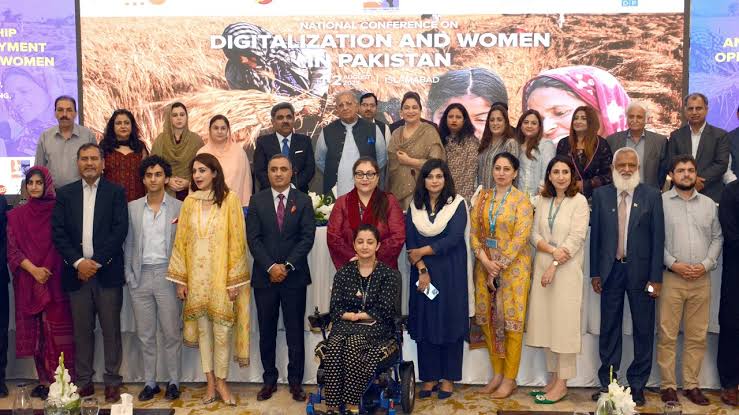According to Pakistan People’s Party (PPP) leader Farhatullah Babar, an estimated 11 million women in Pakistan still lack digital registration, which means they are unable to exercise their right to vote. Additionally, about 17 million women did not cast their votes during the 2018 general elections. This lack of digital registration also affects approximately 2.6 million women in the Khyber Pakhtunkhwa province, preventing them from obtaining National Identity Cards (NICs) and thereby restricting their participation in political, social, and economic progress. Without these NICs, these women are also unable to access public social safety, education, and health services.
During a conference titled ‘Digitalization & Women in Pakistan,’ organized by the National Commission on the Status of Women (NCSW) in collaboration with UN Women, UNFPA, and others, Farhatullah Babar emphasized the importance of digital registration for the country’s economic development. Having an ID card allows individuals to access public resources and enjoy public services while exercising their fundamental rights granted by the constitution without discrimination.
Various speakers at the conference stressed the significance of collecting digital data through a country-wide consultative process involving public and private sectors, civil society, academia, media, and think tanks. Nilofar Bakhtiar, Chairperson NCSW, highlighted that women constitute 49 percent of the population and emphasized the need to work for the advancement of both women and the country. Senator Seemi Ezdi spoke about the importance of having a unified vision while formulating relevant policies and implementation guidelines, especially when equipping women and girls with digital skills.
During the conference, representatives from provincial departments of Women Development, Social Welfare, Provincial Commission on the Status of Women (PCSWs), Information and Technology, Planning and Development, and Technical Education designed policy frameworks based on the ‘Digitalization & Women in Pakistan’ report for each province, including Gilgit Baltistan and Azad Jammu and Kashmir. Furthermore, a revised Child Marriage Restraint Act was presented to the Minister of Human Rights, Riaz Hussain Pirzada, with the promise to pass the bill before the current assembly dissolves.
As technology continues to play an increasingly crucial role in our daily lives, digital registration for women in Pakistan becomes not just a matter of convenience but a fundamental aspect of ensuring their rights and participation in the nation’s development. The lack of digital registration and National Identity Cards for millions of women means they are often overlooked and excluded from crucial decision-making processes. This not only limits their access to public services but also hinders their ability to engage in various aspects of society, be it politics, education, or healthcare.
The conference titled ‘Digitalization & Women in Pakistan’ brought together policymakers, experts, and stakeholders to shed light on this critical issue. It emphasized the need for a comprehensive approach to digital registration that involves a country-wide consultative process, engaging both public and private sectors, civil society, academia, media, and think tanks. Such a collaborative effort would ensure that the policies and implementation guidelines consider the diverse needs and challenges faced by women across different regions and communities in Pakistan.
Moreover, digital registration for women is not just about empowering them individually; it is also about bolstering the country’s economic growth. When women have equal access to resources and opportunities, they can contribute significantly to the nation’s development and progress. By empowering women through digital registration and providing them with the necessary tools and skills, Pakistan can tap into the potential of half of its population and create a more inclusive and prosperous society.
During the conference, speakers emphasized the need for a unified vision when formulating relevant policies, particularly those aimed at equipping women and girls with digital skills. Education and digital literacy are essential for women to navigate the digital landscape effectively, empowering them to participate in various sectors, including entrepreneurship and the rapidly growing technology-driven industries.
The commitment to pass the revised Child Marriage Restraint Act further exemplifies the conference’s dedication to addressing gender-based issues in the country. By taking concrete steps to protect young girls from early and forced marriages, Pakistan shows its determination to create a safer and more equitable environment for women to thrive.
The ‘Digitalization & Women in Pakistan’ conference highlighted the pressing need to bridge the digital divide that disproportionately affects women in the country. By promoting digital registration and providing women with access to National Identity Cards, Pakistan can unlock their potential and empower them to play an active role in shaping the nation’s future. Such initiatives will not only promote gender equality but also contribute to the overall development and progress of the entire country.











